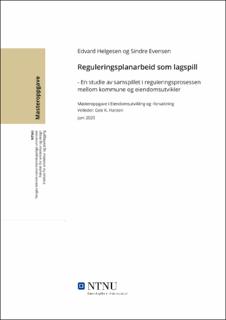| dc.contributor.advisor | Hansen, Geir K. | |
| dc.contributor.author | Helgesen, Edvard | |
| dc.contributor.author | Evensen, Sindre | |
| dc.date.accessioned | 2023-05-15T17:19:40Z | |
| dc.date.available | 2023-05-15T17:19:40Z | |
| dc.date.issued | 2020 | |
| dc.identifier | no.ntnu:inspera:61009049:39748275 | |
| dc.identifier.uri | https://hdl.handle.net/11250/3068014 | |
| dc.description.abstract | Formålet med studien er å avdekke hvordan man kan forbedre samspillet mellom kommune og eiendomsutvikler. Dette er gjort ved å undersøke hvordan dagens reguleringsprosess legger opp til samspill. Videre er det studert hvordan partene opplever samspillet, hvor det er sett på faktorer som rolleforståelse, kompetanse, kommunikasjon og tillit. Det har også blitt redegjort for hvilke barrierer som forhindrer samspill, og hva som eventuelt skal til for å motvirke eller redusere barrierene.
Oppgavens teoretiske rammeverk fokuserer på ulike faktorer vedrørende samspill i reguleringsprosessen. Det blir gitt en innføring i plan- og reguleringsprosesser, med særlig hensyn til hvordan de juridiske rammene hensyntar samspill, aktørenes rolle samt saksgang og møtepunkter i reguleringsprosessen. Videre gjennomgås viktige momenter innen eiendomsutviklingsprosessen, og hvilken betydning samspill kan ha for risiko og fremdrift for en eiendomsutvikler. Det blir også redegjort for hva som inngår i et samspill, og hvilke forutsetninger som må være til stede for å oppnå et godt samspill.
De empiriske dataene ble innhentet ved å gjennomføre 14 intervjuer med totalt 15 informanter. Utvalget bestod av fire ulike kommuner i forskjellige fylkeskommuner, hvor eiendomsutviklerne har prosjekter i én eller flere av disse. Intervjuobjektene besto primært av saksbehandlere i kommunen, og prosjektledere hos eiendomsutvikleren. Intervjuene ble transkribert, og deretter analysert ved å strukturere og redusere materialet ved bruk av koding.
Det fremkommer at prosessen i stor grad åpner for muligheten til samspill, men at det i mindre grad blir gjort i praksis. Både behovet og mulighetene for samspill er størst i tiden før og rundt oppstartsmøtet, og det bør utarbeides en standard for hvordan partene skal gå frem for å sikre et godt samspill. Aktørene opplever en viss form for samspill, men det fremgår tydelig at det er forbedringspotensial. Særlig angår dette partenes rolleforståelse, kommunikasjon og tillit. Det er identifisert flere barrierer som kan forhindre aktørenes samspill. For aktørene er det viktig å være bevisst på at man kan ha ulike interesser, fagfelt, tilnærminger til prosessen og personlige egenskaper.
Masteravhandlingen konkluderer med at kommunikasjon, kompetanse, tillit og rolleforståelse vil være avgjørende for å oppnå en vellykket reguleringsprosess. Med dette bekreftes hypotesens utspill om at forbedret samspill vil gi en bedre reguleringsprosess, og muligens ha en påvirkning på effektiviteten gjennom forbedret forutsigbarhet. | |
| dc.description.abstract | Most approved zoning plans nationwide are provided by private organizations, and it is currently expected that real estate developers are responsible for both the development and transformation of spaces. However, if the real estate developer is to realize his plans, municipal permission is required. These requirements are often not easily reconciled in practice and good interaction between the parties will be a necessity.
The purpose of this study is to discover how to improve the interaction between the municipality and the property developer. This is achieved by examining how current zoning processes allow for interaction between the parties involved. Furthermore, the study examines how the parties involved experience the interaction, with emphasis on factors such as role understanding, competence, communication and trust. It also clarifies which barriers prevent interaction, and what is required to counter or reduce these barriers.
The theoretical framework of the thesis focuses on various factors regarding interaction in the zoning process. An introduction to planning and zoning processes is given, with particular regard to how the legal framework for interaction works, the organizations' different perspectives as well as procedures and meeting points in the zoning process. In addition, the study will review key aspects of the property development process and how interaction may affect risk and progress for a property developer. What the interaction consists of and prerequisites to achieving 'good interaction' is explained.
The empirical data was obtained by conducting 14 interviews with a total of 15 informants. The sample consisted of four different municipalities in different county municipalities. The property developers had projects in one or more of these municipalities. The informants consisted primarily of case officers at the municipality, and project managers at the property developer. The interviews were transcribed, and later analyzed by structuring and reducing the material using coding.
The presentation of results was discussed in conjunction with the literature and put in context with the research questions and problem statement. It appears that the process is largely open to the possibility of interaction, but that it is done to a lesser extent in practice. Both the need and opportunities for interaction are highest in the time before and around the commencement of work on the plan. Therefore, a standard should be prepared for how the parties should proceed to ensure good interaction. Property developers and the municipality are experiencing some form of interaction, but there is a clear potential for improvement, especially in regard to their understanding of roles, communication and trust. Additionally, several barriers which may prevent the parties from interacting optimally have been identified. It is important for the parties involved to be conscious of the fact that the real estate developer and case officer may have different approaches to the process, subject areas, interests and personal characteristics.
The Master's thesis concludes that communication, competence, trust and understanding of the roles will be crucial in order to achieve a successful zoning process. This confirms the hypothesis that improved interaction will result in a better zoning process, and possibly have an impact on efficiency through improved predictability. | |
| dc.language | nob | |
| dc.publisher | NTNU | |
| dc.title | Reguleringsplanarbeid som lagspill | |
| dc.type | Master thesis | |
